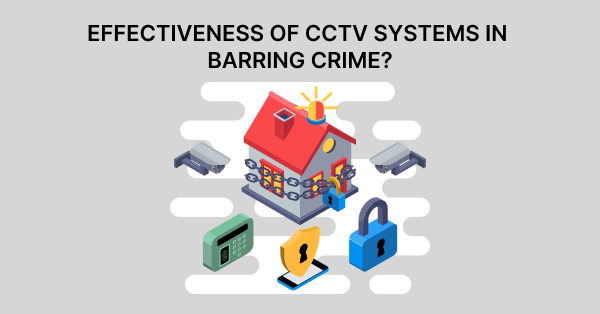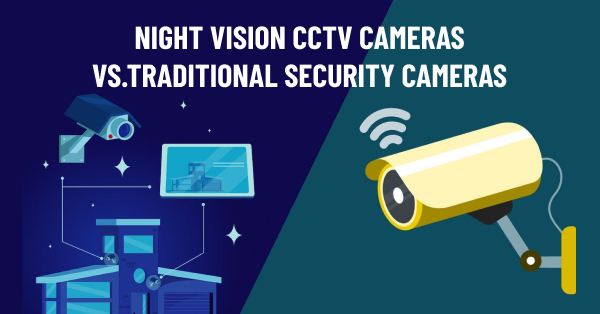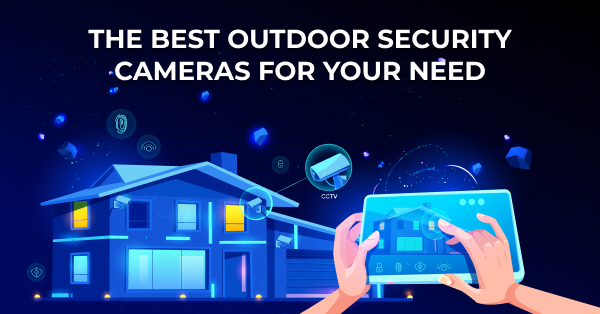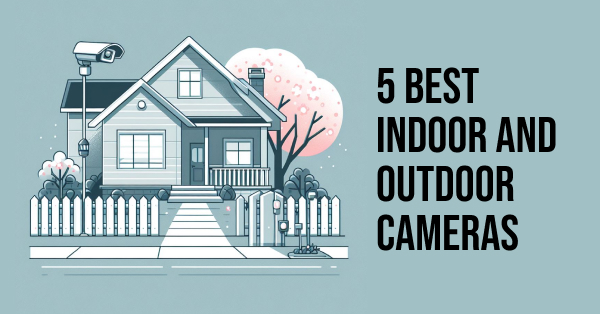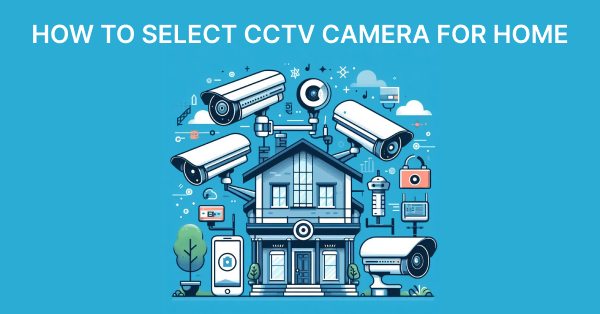
How to Select CCTV Camera for Home | Secure by CCTV
Discover expert tips for choosing the right CCTV camera for your home security needs. Make informed decisions for enhanced safety.
Introduction
Closed-circuit television, or CCTV, is becoming a common home security tool. They are useful for keeping track of evidence, deterring crime, and giving homeowners peace of mind. Installing CCTV cameras for home can effectively deter potential robbers and intruders and provide you with a priceless source of surveillance footage in an emergency. Homeowners can monitor their property at all times and from any location with CCTV cameras. Homeowners can gain several advantages by investing in a top-notch CCTV system, including increased safety, improved security, and overall home security.
Assessing Security Needs
Homeowners must deal with many security risks, which could hamper their families and their property’s safety. Break-ins, property damage, theft, vandalism, and home invasion are a few frequent security risks. Homes that seem vacant or without security features like CCTV cameras are frequently the targets of burglaries. Home invasions, in which criminals forcefully enter a residence to carry out a crime, constitute a serious threat to an individual’s safety. Certain natural disasters, like storms, fires, or floods, can also put a home’s security at risk. To protect their property and loved ones, homeowners must be aware of these risks and take the necessary precautions.
There are several things to consider while installing CCTV cameras for the home. Start by evaluating your property’s size, architectural features, entrances, and exits. Determine any weak spots, such as windows, doors, or blind spots, that an intruder might try to target. Decide on your security objectives next. Which worries you more: keeping an eye on the property, stopping burglaries, or ensuring your family is safe? After you have a firm grasp on your requirements, think about the various security solutions. This can entail putting in motion-sensor lights, alarm systems, CCTV cameras for home, or stronger locks on windows and doors to reinforce them. The degree of automation and remote access you want from your security system should also be considered. It’s also a good idea to speak with security experts, who have the knowledge and expertise to offer knowledgeable advice. You can create a customized security strategy that fits your house’s unique requirements by assessing these variables.
Types of CCTV Cameras
Resolution and Image Quality
When choosing CCTV cameras for home security, two important considerations are resolution and image quality. The quantity of pixels captured in an image is referred to as resolution, and it directly affects the quality of the image. Better identification of persons, cars, and other objects is made possible by higher-resolution cameras, which generate images with higher levels of clarity, sharpness, and detail. The CCTV resolutions that are most frequently used are 720p, 1080p, 2K, and 4K. 720p and 1080p resolutions are usually adequate for home security, while 2K and 4K resolutions are frequently utilized for commercial and industrial applications that demand more detailed images.
Apart from resolution, other factors that affect image quality are the camera lens, sensor, lighting, and image processing power. Better hardware and software in higher-end cameras usually translate into better image quality. To make sure you choose the best CCTV camera for your particular needs, carefully consider resolution, image quality, and related features like night vision, wide-angle lens, and digital zoom when choosing cameras for home security.
Camera Features
The effectiveness of CCTV cameras for home security largely depends on the cameras’ features. The most important features are two-way audio, motion detection, night vision, and remote viewing. For cameras installed in low light, night vision is essential. With the help of infrared LEDs, you can see well even in total darkness, giving you round-the-clock home security monitoring. Motion detection lets you send alerts to your mobile devices, set off alarms, and identify movement within a designated area. You can use it to monitor your house in real time and spot any unusual activity. With two-way audio, you can talk to people close to the camera. You can use your mobile device to listen to the audio as well.
Another important feature is remote viewing. You can view the camera feeds from any global location with a computer or smartphone. While you’re away, you can monitor your property and check on your house, pets, and kids. Think about these features while choosing a CCTV camera for home security, and pick the ones that best suit your requirements.
Storage Options
Storage solutions for CCTV cameras in homes are essential for capturing and keeping track of surveillance footage. Local storage and cloud storage are two of the available storage options. Using a specialized network video recorder (NVR) or an integrated memory card is known as local storage. Although memory cards are affordable and practical, their storage capacities are restricted. NVRs, on the other hand, have more storage space and support several cameras. On the other hand, surveillance footage can be remotely stored on secure servers via the internet thanks to cloud storage. It provides the benefit of improved data security along with the ability to view footage from any location. Cloud storage, however, might require internet access and have a subscription cost. Depending on your needs for storage, your budget, and your convenience, you can choose between local and cloud storage. While installing CCTV cameras for home, it’s critical to give careful thought to storage options in order to guarantee dependable and effective recording and retrieval of surveillance footage.
Power and Connectivity
While installing CCTV cameras for home, power and connectivity are crucial factors to consider. In order to function, CCTV cameras usually need a power source. Camera powering comes in two primary flavors: wired and wireless. To guarantee a steady power supply, wired cameras are directly connected to an electrical outlet or a power over Ethernet (PoE) switch. Conversely, wireless cameras operate on solar power or rechargeable batteries, allowing for greater placement flexibility but possibly requiring regular maintenance or charging. In terms of connectivity, wired or wireless networks can be used to link CCTV cameras to the internet.
For dependable and steady internet access, wired connectivity requires connecting the cameras via Ethernet cables to a router or network switch. Wi-Fi networks are necessary for wireless connectivity, which makes camera placement more flexible and installation easier. To facilitate remote access and camera monitoring, it is imperative to establish a robust and secure network connection.
Budget Considerations
Finances are a major factor when installing CCTV cameras for home security. Establishing a budget that fits both your financial situation and your surveillance requirements is critical. The total cost can be influenced by several variables, such as the quantity and quality of cameras needed, storage capacities, and extra features like motion detection or night vision. Choosing a DIY installation, where you buy the cameras and equipment separately and set them up yourself, is one way to save money. Installation costs may be reduced by doing this, but technical expertise may be needed. Prioritizing key areas for surveillance and placing cameras there strategically instead of all over the property is another cost-effective strategy. Long-term costs must also be taken into account. This involves researching storage options that require a cloud storage subscription fee or purchasing local storage devices like memory cards or NVRs. Choosing cameras with power-saving features or those that are energy-efficient can also help reduce electricity expenses.
Budgetary considerations are crucial, but it’s just as important to maintain the CCTV system’s dependability and quality. Strive for a balance between usefulness and price at all times to provide good home security without going over budget.
Installation and Maintenance
Effective surveillance requires the installation and upkeep of CCTV cameras for home protection. It’s crucial to carefully place the cameras during installation to cover high-traffic areas and access points. For a safe and smooth setup, adhere to the manufacturer’s instructions or get expert help.
Regular maintenance is required to maintain the best possible performance of the CCTV system. To get clear footage, this entails cleaning the housings and lenses of the cameras, tightening the connections, checking the cables for damage, and upgrading the cameras’ software to reflect the most recent security features. Data loss may be avoided, and security breaches can be avoided by periodically reviewing recordings and monitoring storage capacity. Creating a maintenance program may quickly identify and resolve possible problems through expert inspections and service.
Conclusion
Choosing the best CCTV camera for home requires considering important elements, including compatibility, weather resistance, resolution, field of view, and night vision. Before picking a choice, evaluating your budget and unique surveillance requirements is critical.


